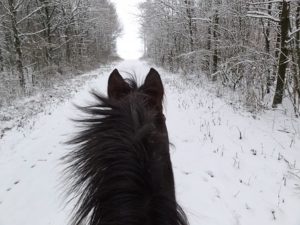Here comes Winter – ready or not!
I grew up in Montana, then lived in Alaska, and now I live in Colorado. I’ve experienced my fair share of cold, dark weather. Although I have to say that Colorado is much warmer than I expected (don’t everyone move here at once). Here are some things to think about before winter truly sets in and you cannot change them!
- Test Water Heaters – Before it is well below freezing, and there isn’t room for error, test your water heaters and make sure they work and the thermostat is properly adjusted. The auto waterers that we used to have would definitely run hot when first plugged in. Follow the user manual guidelines for testing, repairing and preparing water heaters for the winter.
- Check your barn and fence lines – Check for leaks and cracks in your shelter that could allow cold air and moisture inside where it isn’t wanted. Make sure fence posts are sturdy and secured in the ground before it’s below freezing. Fix any posts or wires or boards that are broken or cracked. The cold weather can cause a partially broken fence to be a fully broken fence in no time.
- Make sure you have a backup plan for power outages – Mostly for your horse’s water. Being without lights isn’t a big deal (keep a flashlight easily accessible), but if your well is on electricity, have a supply of water or a generator to run your well pump so you aren’t scrambling to find water for your horse(s)!
- Stock up on supplies – Depending on your weather, winter can cause normal deliveries to be delayed. Make sure you have enough hay, grain and bedding that you can weather a storm for a bit of extra time.
- If you blanket your horse, make sure their blankets are ready for winter – Check for rips and tears and also consider re-waterproofing your blankets as well (the most recent product I used was NikWax Waterproofing Spray). Have the blankets ready to go for the first storm of the season. You don’t want to be scrambling to find a blanket that you need when it is below zero and your horse is shivering.
- Don’t forget about your liquids and medications – Move fly spray, wound spray, medications, Showsheen, etc into a place that it won’t freeze. Some products will separate and therefore cause you to purchase new bottles in the spring. Plan ahead and take things out of the cold that won’t survive!
I see a lot of posts on social media and talk to a lot of people about how to keep water tanks liquid in the winter. I am lucky enough that we have power right by where Dede lives, so I can just plug the water heater into the outlet directly. But a lot of people have limited or no access to power, and that creates some problems! We have found that just having the tank out of the wind and direct weather can help keep the temperature up as well as reduce the evaporation rate. If you read my previous post, you will learn that we removed our automatic waterers – best decision ever – but now we have to keep a closer eye on Dede’s water tank. Here are some suggestions for keeping water readily available for your horse in the winter:
- Make sure that your tank heater is safe to be plugged into an extension cord, I know the one we purchased expressly says, “do not plug into extension cord”. Better safe than sorry.
- Keep a clean stick by your water, then you can punch a hole through the ice without getting your gloves soaking wet!
- Put the tank near a wind block or inside your horse’s shelter. Taking it away from the elements will make it more difficult for the water to freeze.
- I’ve heard that putting salt water jugs into the tank can decrease the freezing temperature (i.e. it takes a lower temperature until the water will freeze) but I’ve also heard this doesn’t work. Let me know what you find out.
- If you don’t have access to electricity, they do make propane stock tank heaters. There are also waterers called “the drinking post” that are deep enough (and your horse pushes to access water) that they won’t freeze. I don’t know much about them, but I’m interested!
- If you have the space/use for it, there are continuous flow tanks, which use the idea that since the water is constantly moving, it takes longer to freeze (think about creeks and rivers).

Leave a Reply